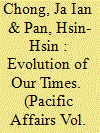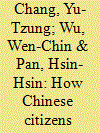|
|
|
Sort Order |
|
|
|
Items / Page
|
|
|
|
|
|
|
| Srl | Item |
| 1 |
ID:
188666


|
|
|
|
|
| Summary/Abstract |
Recent studies revisit the debate over whether tourism promotes peace via intergroup contacts. In this article, we examine the case of China-Taiwan confrontation and argue that the increase of Chinese tourists visiting Taiwan contributes to peace across the Taiwan Strait. Specifically, the touristic experiences and interactions with Taiwanese improve Chinese people’s understanding of Taiwan, fostering a patient and peaceful attitude toward the prospect of cross-Strait relations. With the survey data collected during July and September 2013, we find that Chinese people who were visiting Taiwan for the first time were less likely to support a rapid pace to the unification between China and Taiwan or unification by force than those who had never visited Taiwan. Additionally, the attitude is stronger among independent tourists than those who came in escorted tour groups. Our findings suggest that contacts between tourists and locals are effective in alleviating political tension across the Taiwan Strait.
|
|
|
|
|
|
|
|
|
|
|
|
|
|
|
|
| 2 |
ID:
187730


|
|
|
|
|
| Summary/Abstract |
Two trends have become increasingly apparent from public opinion polls in Taiwan and Hong Kong over the past decade. One is a growing identification with and confidence in being exclusively Taiwanese or Hong Konger. The other is increasing public support for democracy. Existing research investigates the association between local identity and democracy, but does not address the meanings people in Taiwan and Hong Kong ascribe to their identities. This limits a fuller understanding of the relationships and driving forces between and behind these trends. One interpretation is that demands for greater democracy mask growing nativism, even xenophobia. An alternative one is that heightened local identification reflects aspirations for greater political participation and restraint on executive authority in Taiwan and Hong Kong. Using discourse analysis collected through the Making Identities Count in Asia project, alongside polling data, we submit that elite and mass discourse reveal an integration of democratic expectations with local identity and its broadening appeal in Taiwan and Hong Kong. People in these two societies take principles associated with democracy to be closely tied to their sense of identification and locality. Such ideas do not eschew the value of tradition rooted in local experiences and can outweigh economic growth. However, Hong Kongers and Taiwanese have come to identify substantively more with democracy than the exceptionalism implied in “localism,” “Asian values,” or some form of nativism. PRC attempts to appeal to local concerns in Taiwan and Hong Kong need to grapple with either meaningful respect for democratic aspirations or effectively repressing them. PRC insistence on the erasure of such values will likely result in continued tensions with Taiwan and Hong Kong, and include mass resistance and the need for force, even violence.
|
|
|
|
|
|
|
|
|
|
|
|
|
|
|
|
| 3 |
ID:
153411


|
|
|
|
|
| Summary/Abstract |
While many studies have investigated Taiwanese people’s attitudes towards cross-Strait relations, few studies explore how Chinese people on the other side of the Taiwan Strait perceive the Taiwan issue. Using data collected via a telephone survey that covers 2,000 respondents from ten major cities in China in 2013, this article presents empirical evidence to fill this gap. It finds that most Chinese citizens’ attitudes are aligned with the government’s propaganda on cross-Strait relations. In particular, Chinese citizens have inaccurate perceptions of Taiwanese support for reunification with China. This article also finds that when Chinese respondents think that the city in which they live is more economically advanced than Taipei, the capital of Taiwan, they would support: (1) a faster pace towards a resolution, and (2) the use of military force to resolve cross-Strait confrontations. These findings offer new perspectives on studies of cross-Strait relations and Chinese nationalism.
|
|
|
|
|
|
|
|
|
|
|
|
|
|
|
|
| 4 |
ID:
174225


|
|
|
|
|
| Summary/Abstract |
Based on the fourth wave of the Asian Barometer Survey, I examine the contours and determinants of East Asians’ role model choices. The results show that pro-authoritarianism rule, recognition of China’s regional hegemon status, perception of China’s soft-power image, admiration for good governance, or inward-looking nationalism make East Asians more likely to choose an alternative role model rather than the USA. If the USA should loom out of East Asians’ vision for their country role model, the alternative role models would carry consequences in a potential shift in the democratic regime paradigm and a possible change in the political landscape in East Asia.
|
|
|
|
|
|
|
|
|
|
|
|
|
|
|
|
|
|
|
|
|